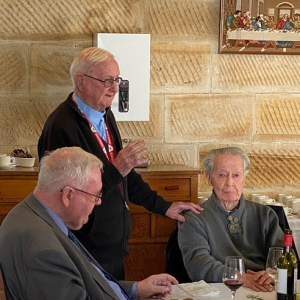Displaying items by tag: Vince Carroll MSC
Paul Beirne, an autobiography: Vagabond - The Journey Home
Paul Beirne, an autobiography: Vagabond - The Journey Home

A Review by Vince Carroll MSC
2024. 509 pp. Available on Amazon. C $10.
Paul Beirne is a past student of Downlands, former SVD priest, Dean of the University of Divinity, Director of the Heart of Life Centre, 2014-2021
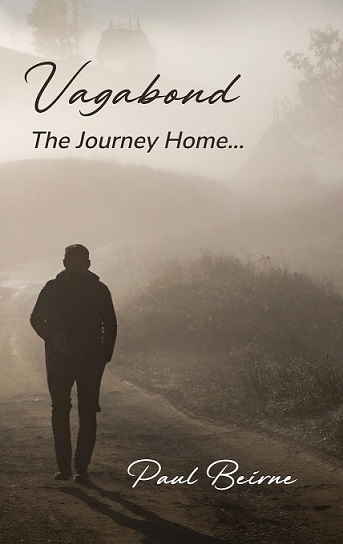
This is a very personal story of Paul’s life as a Divine Word Missionary priest (SVD) and his Missionary work when in training, his studies/work in the USA, and his later work as a Formator for the SVD’s of Pre-Novitiate Candidates, and finally his time as founder and Superior of the SVD Region in South Korea. Disillusioned with the church there and also his society I feel, he left the order and the priesthood after 34 years, married and happily now has two children with Anna.
He writes very beautifully and intimately. I believe he attacks no one in the process, but reports it all as part of his journey. I think the Home he is referring to is the Home of his heart. Deferentially, he thinks of himself as a Vagabond. His writing is very honest, and probably too much so for some. He does not shrink from reporting his sexual exploits, but also for unveiling much of the conflict that was below the surface in (some) SVD communities he worked in/or led. I do not think he left the priesthood over sex/sexuality specifically – that was part of it – but that deeper factors were in play, as he searched actively for his personal meaning/purpose in life.
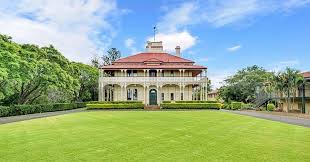
I was particularly attracted to his work as I too thought of becoming an SVD and also experienced a similar Novitiate as the SVD experienced in Marburg, Queensland (where my mother grew up and I know intimately); likewise I worked in PNG for seven (7) years as he did for two. My experiences there were mild in comparison to his – but then I was much older: I 40 years plus, he 19! Then too I have experienced OS Mission in the church, in post-apartheid South Africa (18 years - in two language groups), as well as in PNG (7 in two places) and among the Aboriginal people of Australia (especially the Tiwi of Bathurst island). My experience in those places did not give me the burdens he had to bear in South Korea. But they were demanding enough for me.
I warmed very much to his description of the land and the landscape found in many places in the book, as I also claim to be an environmentalist and warm to the Land, the vegetation and the wild life that he describes in several parts. His experience there it seems to me comes to best expression in his stories of the Fish that flew and the grove of trees in South Korea, that mediated earth, God and sky to him. This Book of Nature is one that reveals God to us. I believe in Paul’s latter chapters he has not quite depth the meaning of this and, for me, the book trails off towards the end.

The flip side to this quasi-mystic engagement with the earth was his growing urgency round sex and sexuality, and finally his obvious contentment in his Marriage and Family Life, which for him is the Home for which he had struggled.
But the road there had been very bumpy: I think he tells some stories of the novitiate days “with advantage” as Shakespeare says – as we all tend to! Then his accounts of his time as Formator in Melbourne is pretty “blokey” – as were our own experiences and for anyone in those days in seminaries. (Football and Grog!) From the conflicts established in a free wheeling pre-novitiate experience that he allowed, he began to find solace in the more and more frequent company of women. This tension, between his vowed celibacy and his priesthood, was not new to him, but eventually added to his reason for departing the priesthood.

His studies and work for the down and out in America are admirable, and it seemed to give him a direction for his Mission in life. He seemed to be happiest when working directly with the poor and down and out. But the Church in Korea with a style like the Confucius hierarchy he could not cop, nor cope with. This was the main seed of his vocation’s destruction – and yet strangely the source of new life as well. Something had to die in order for something else to grow.
This book could well be read by all priests and ex-priests, but especially those in their senior years, as they reflect on their own journey, their loyal contribution to the church and consider what is the Home to which their hearts aspire. Lay Catholics who have shared the burden of the last 60 years in the church may also relish this book. I gave it a 4 star rating.

Paul was the Captain of Downlands College (1964) and one of the earliest alumni to go by his choice to an order other than the MSC. In later life he worked for the MSC as Director in our Heart of Life Centre in Melbourne. He makes only veiled reference (two) to his boarding school life and does not mention the MSC nor Heart of Life at all. I find this remiss.
Vince Carroll MSC

Memorials of two of our recent deceased confreres
Memorials of two of our recent deceased confreres
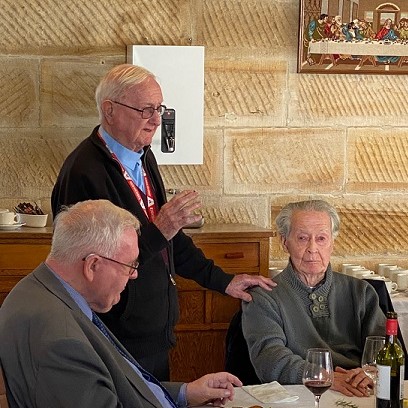
Arthur Stidwill MSC
Arthur supplied in Lismore Diocese, the parish of Casino,
A tribute to him by Fr Peter Slack,

Naturally, I am sad but it is a strange sadness. Sad for myself that I will not see Arthur again, but not sad for him. After all he has reached journey’s end. I am reminded of Maurice West’s reflections in his memoir, “A View from the Ridge” he talks about death in these or similar words - Standing on a ridge overlooking a dark valley, I see the lights of the town, the aim of my journey. As I gaze at the lights I know that I must leave the comfort of the ridge and enter the dark valley in order to reach safely to the place that draws me, my home.
We first met in Ottawa in my salad days, he in late middle age. He had come from Alotau in his mid fifties to study Canon Law. He had a fine legal mind, sharp and precise. He loved the missions and his Bishop, Des Moore was a close friend and he served that diocese as Vicar General. He was an exemplary religious. Though he came to have a great affection for Casino, and they for him, he always said that he must return to religious home at Kensington. He lived the poverty. Any money he received always went to the MSC’s – he kept nothing. Mass offerings went to a poor school in Africa run by the Sisters of the Sacred Heart. Every day, twice a day, he would be found in Church saying his office.
Using Casino as a home, he helped out in South Grafton and Nambucca and Uralla. But he always returned home “to his religious confreres.”
Herein the parish he visited the elderly. Bishop Des Moore told him, “Arthur, the elderly need our ministry as much as the young. They need to experience the forgiving presence of Christ and tell their stories. They, like us, need healing.” As I grow into what was Arthurs’s age when he first came here to assist, I now appreciate the wisdom of those words.
He had one message – the love of Jesus. Every homily played upon the same theme. It is why the Missionaries of the Sacred Heart was founded, he would say.
When he was last here I invited him to give some talks to the parish. They were livestreamed and we have not only his voice but his face.
At his fiftieth the people the people put together a tribute to him. It now becomes his obituary.
Downlands
11/10/24
+
Very Rev Hugh Slattery MSC
Bishop of Tzaneen, SA. His life and times.
I would like to offer this personal tribute to Bishop Hugh.
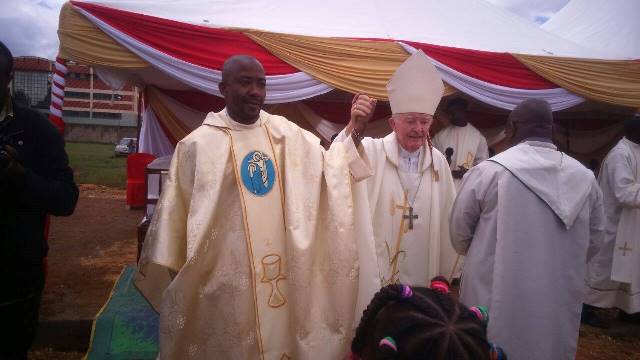
Bishop Hugh Slattery took me “under his wing” (as it were) when in late life (47) I first went to South Africa. He befriended me. He gave me a job, not just as Chaplain in St Brendan’s School but he also used my skills as a Geographer to produce a map of his diocese, especially the catholic installations. That took 6 months and a lot of driving and was a great introduction to the three language groups in the Diocese. At the end, it was the best map of that area I believe, and of those people who previously, under apartheid, had been considered “surplus to requirement!”. I could compare my map to others that had been produced post apartheid – such as Eskoms, done with GPS - and note their errors and mine. We located and named 800 villages – 200 Catholic facilities. + Hugh was grateful and urged me to continue studies to a PhD level. I didn’t.
Aids came in in the 1990s and the effect was devastating: deaths and funerals in all villages every weekend. The smoke arose from the cooking pots – set up to cater for the influx of mourners. Funeral societies grew rich. + Hugh took the lead combating it, establishing with the OLSH Sisters (Australian many) Kurisinani (“We care for each other”), and with his books and sermons counselled and encouraged his people through. Money and facilities began to arrive. I worked hard at being chaplain in the school, but also in holidays especially and with the aid of Kurisanani, worked on comprehensive programs to do with caring for the sick, Orphans, Youth and the redevelopment Married Life.
Severe floods in the year 2000 that destroyed 150 bridges in Limpopo Province was a “blip” along the way, but it demanded a lot of re-building of mud homes that had melted and collapsed in the downpour. The church was on the front foot in that reconstruction. 5 Million people live in Limpopo.
Bishop Hugh at that time was also completing the building of Ave Maria Pastoral Centre. That was a mighty effort – a fully functional Centre for over 120 people. I enjoyed there with adults and St Brendan’s students and the priests many a refreshing course. At an hour’s drive it became like a second home to me. + Hugh lived later there in retirement. + Hugh had also completed with the help of a Catholic Lay man architect and engineer, St Brendan’s College – which had 600 boarders when I started in 1997, and despite many turbulent times with deaths among staffs and students and difficulties with Governments, provided some of the best education in rural South Africa at that time. At one time we had to “sack” the principal for “grooming”. All the kids knew and approved the sacking! St Brendans was the first rural school in SA to have a set (20) of Computers – a second hand gift from the Anglo America Company in 1997. After his effort at completing the school, Bishop Hugh had to take extended leave.
We understood each other: I said one time “Bishop if you wont listen to me, I wont talk to you” – he did! But he also made it clear that he didn’t need my help in confirming as I had suggested. One day he confirmed 176 and it took several hours. Noone complained. They just enjoyed the singing and the dancing. Why stop when you are having fun!? I liked +Hugh’s straight talk.
Whenever he visited or I, we walked and talked and played Golf occasionally. I don’t think a lot of the new English Translation of the mass texts that we still suffer from – but + Hugh worked on that project with George Cardinal Pell, and had me convinced its was going to be the “ants pants”! More seriously, His first move with me was to get me to go to a three day seminar on Witchcraft at the University of the North. No joke! Witchcraft is a real thing in the Limpopo Province, the epicentre of it in Africa. They have a martyr in the form of Benedict Daswa to prove it. You are “the fool” if you discount it!
+ Hughs humour was of the dry type. He used to note that he set out from his home place to become an SMA (Society of Missionaries to Africa), and by mistake finished up at the MSC house on Cork. The SMA were founded in 1856 in France, so he wasn’t far out, and also had their novitiate in Cork! He also noted that he had more elephants (50,001 – in Kruger Park) in his Diocese than Catholics (50,000) – a mere 2% od the human population.
The elevation of Benedict Dazwa (Thsimagadzo - Wonder worker was his local name) was perhaps the crowning glory for Hugh. He asked me to take up the cause, and I replied “Ive got enough to do here (at school),” considering at a part time job. French Confrere Andre Boas MSC did it, went to Rome for 8 months, learnt Italian and three years later in 2016 the first South African lay man saint and martyr was proclaimed. This was a triumph for Bishop Hugh and a diamond in the MSC list of Martyrs.
In retirement Hugh and I remained friendly and would get together whenever I returned to SA, and when I was still there working in Holy Family Orphanage from 2015 onwards. Sr Sally Duigan was my boss. What a great work of mercy that is. It was established in the old MSC Novitiate/ seminary at Ofcolaco.
I have worked with/ for 11 Bishops and he was one of the best: friendly to me but not so well received by his Irish Confreres. His work in the Lumko Institutes with other Irish MSC – Paddy Whooley and Dick Broderick is well known, but that was before my time. Lumko is and was a great credit to our Irish Province with its grass roots theology, or is it “Cooking Pot Theology?” + Hugh could preach in the three local languages.
In retirement + Hugh was gracious and still interested in all things to do with church/ world. We corresponded occasionally. Im sorry to say I probably offended him in my last letter this year, having just re read Pakingham’s, The Scramble for Africa and Conrad’s Out of darkness. I asked simply: What really has the church done to improve the lot of Africans over 400 years? I’m sure +Hugh will forgive my bumptious questioning, and will add background to help me think with a better frame of mind.

Vince Carroll MSC

